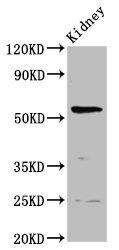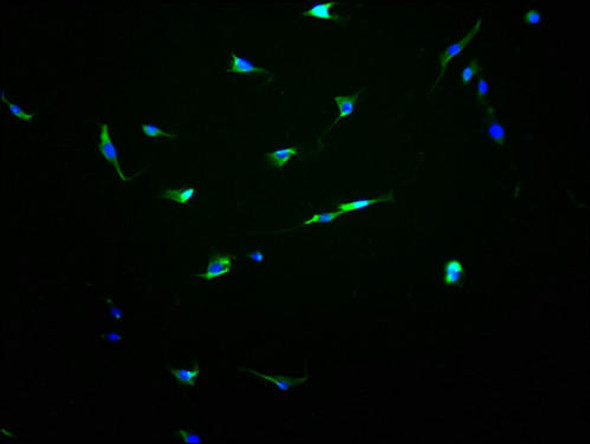Description
| Antibody Name: | PIGW Antibody (PACO58240) |
| Antibody SKU: | PACO58240 |
| Size: | 50ug |
| Host Species: | Rabbit |
| Tested Applications: | ELISA, WB |
| Recommended Dilutions: | ELISA:1:2000-1:10000, WB:1:500-1:5000 |
| Species Reactivity: | Human, Rat |
| Immunogen: | Recombinant Human Phosphatidylinositol-glycan biosynthesis class W protein (392-448AA) |
| Form: | Liquid |
| Storage Buffer: | Preservative: 0.03% Proclin 300 Constituents: 50% Glycerol, 0.01M PBS, pH 7.4 |
| Purification Method: | >95%, Protein G purified |
| Clonality: | Polyclonal |
| Isotype: | IgG |
| Conjugate: | Non-conjugated |
 | Western Blot. Positive WB detected in: Rat kidney tissue. All lanes: PIGW antibody at 3.7µg/ml. Secondary. Goat polyclonal to rabbit IgG at 1/50000 dilution. Predicted band size: 57 kDa. Observed band size: 57 kDa. |
| Background: | Required for the transport of GPI-anchored proteins to the plasma membrane. Probable acetyltransferase, which acetylates the inositol ring of phosphatidylinositol during biosynthesis of GPI-anchor. Acetylation during GPI-anchor biosynthesis is not essential for the subsequent mannosylation and is usually removed soon after the attachment of GPIs to proteins (By similarity). |
| Synonyms: | Phosphatidylinositol-glycan biosynthesis class W protein (PIG-W) (EC 2.3), PIGW |
| UniProt Protein Function: | Required for the transport of GPI-anchored proteins to the plasma membrane (PubMed:24367057). Probable acetyltransferase, which acetylates the inositol ring of phosphatidylinositol during biosynthesis of GPI-anchor. Acetylation during GPI-anchor biosynthesis is not essential for the subsequent mannosylation and is usually removed soon after the attachment of GPIs to proteins (). |
| UniProt Protein Details: | |
| NCBI Summary: | The protein encoded by this gene is an inositol acyltransferase that acylates the inositol ring of phosphatidylinositol. This occurs in the endoplasmic reticulum and is a step in the biosynthesis of glycosylphosphatidylinositol (GPI), which anchors many cell surface proteins to the membrane. Defects in this gene are a cause of the age-dependent epileptic encephalopathy West syndrome as well as a syndrome exhibiting hyperphosphatasia and cognitive disability (HPMRS5). [provided by RefSeq, Jul 2017] |
| UniProt Code: | Q7Z7B1 |
| NCBI GenInfo Identifier: | 1092878785 |
| NCBI Gene ID: | 284098 |
| NCBI Accession: | NP_001333683.1 |
| UniProt Secondary Accession: | Q7Z7B1,Q8N9G3 |
| UniProt Related Accession: | Q7Z7B1 |
| Molecular Weight: | 56,882 Da |
| NCBI Full Name: | phosphatidylinositol-glycan biosynthesis class W protein |
| NCBI Synonym Full Names: | phosphatidylinositol glycan anchor biosynthesis class W |
| NCBI Official Symbol: | PIGW |
| NCBI Official Synonym Symbols: | Gwt1; HPMRS5 |
| NCBI Protein Information: | phosphatidylinositol-glycan biosynthesis class W protein |
| UniProt Protein Name: | Phosphatidylinositol-glycan biosynthesis class W protein |
| UniProt Synonym Protein Names: | |
| Protein Family: | Phosphatidylinositol-glycan biosynthesis class W protein |
| UniProt Gene Name: | PIGW |
| UniProt Entry Name: |






